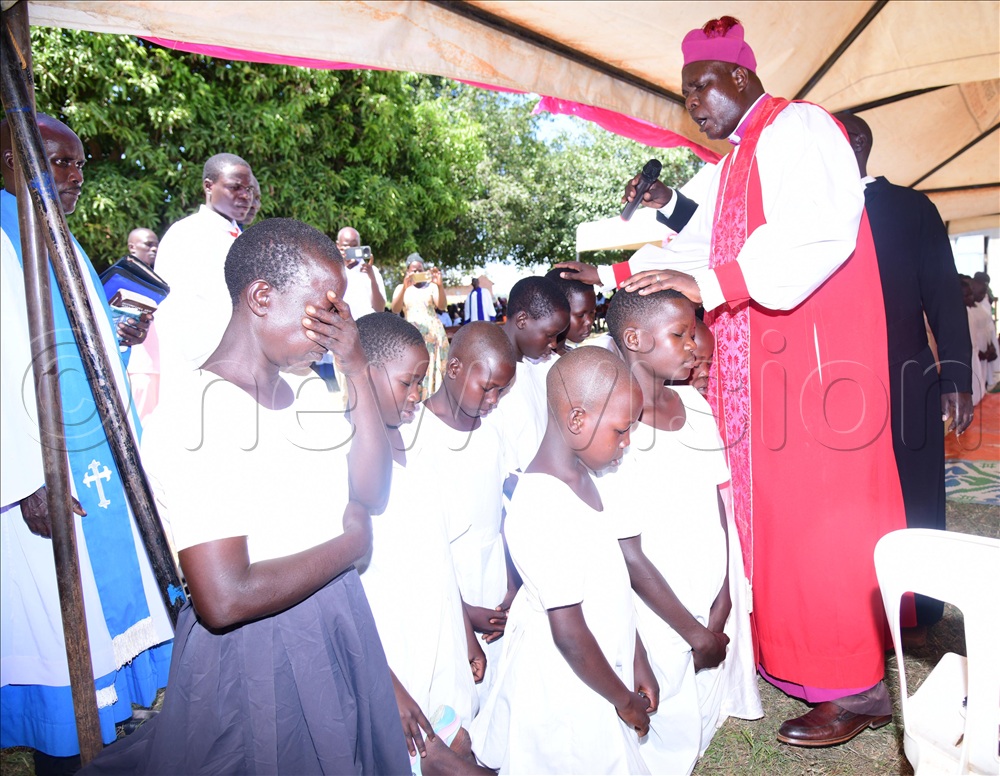No wedding, burial without planting 100 trees, Soroti bishop declares
“Teso is dry because we have attacked God’s creation. We cut trees, but we do not replace them,” he said.
The Bishop of Soroti Diocese, Kosea Odongo preaching at Aukot parish in Soroti district on Thursday. (Photos by Godfrey Ojore)
________________
The Bishop of Soroti Diocese, Kosea Odongo, has introduced a strict new directive requiring families to plant at least 100 trees before any burial, wedding celebration or significant family ceremony can be held.
The order comes as the Teso subregion faces a prolonged drought expected to continue until mid-March next year.
Bishop Odongo announced the directive on Thursday (November 27) during a confirmation service for 66 Christians, where he also commissioned Fathers’ and Mothers’ Union members at Aukot parish in Soroti district.
He said the decision was a response to the severe effects of climate change, which has damaged infrastructure, threatened biodiversity, disrupted livelihoods and increased health risks linked to vector-borne and waterborne diseases.
According to the bishop, climate change is now a reality driven by human activity and the continued destruction of the environment.
“Teso is dry because we have attacked God’s creation. We cut trees, but we do not replace them,” he said.
He ordered all clergy, including priests and lay readers, not to preside over any funeral rites unless the bereaved family has planted a minimum of 100 tree seedlings.
“Before you start conducting a funeral service, kindly ask for the trees. Without them, just leave that place,” Bishop Odongo said.

“If you continue with the service, you would not be meaning well for the people that person has left behind.”
The bishop extended the same requirement to all major life celebrations in the diocese, including birthdays, wedding anniversaries, bridal introductions, thanksgiving events, and celebrations of pregnancy and childbirth. Each occasion must be accompanied by the planting of at least 100 tree seedlings.
Bishop Odongo also encouraged families to incorporate tree seedlings into customary marriage practices. Traditionally, a suitor presents a letter with money enclosed for the bride’s parents. The bishop said this practice should be updated to include environmental responsibility.
“I want us to add the aspect of trees,” he said. “Without trees, even when the envelope of money is presented to you, do not accept to let your daughter go.”
He argued that trees offer long-term benefits that dowry alone cannot provide. “Your daughter is going to produce from there, but you are left with dowry that can be used in a short time. With trees, you benefit twice: windbreakers, attracting rain, and money after selling them,” he added.
The directive received strong support from Christians in attendance. “We waste money on artificial flowers instead of trees that can support the family,” said Robert Opolot.
Others said the initiative should be adopted nationally. “This is good, but most people will not implement it. If it becomes a law, within one year Uganda will be green, and rain will be plenty for us,” said Francis Oriokot from Awoja.
Uganda’s forest cover has been heavily depleted over several decades due to deforestation, charcoal burning and the expansion of farmland.
Although government interventions have increased forest cover from 9.5 percent in 2015 to about 13.3 percent in 2024, experts warn that faster restoration is needed to counter climate change.
The Teso region remains particularly vulnerable. Prolonged dry spells and erratic rainfall have undermined farming, the main source of livelihood for most families.
Environmental activists in the region say Bishop Odongo’s directive could set an important precedent for faith-based climate action if it is fully enforced.
For now, the bishop remains firm in his position.
“For every life event, plant a tree,” he said. “God entrusted creation to us, and it is our duty to restore it.”